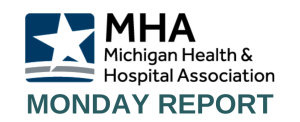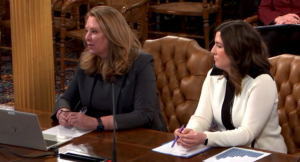
 The release of the Michigan Senate and House Appropriations Health and Human Services Subcommittee budgets April 25 include broad investments in healthcare and specific investments advocated for by the MHA. The state budget is at a pivotal point in the process, as individual legislative chambers are releasing budget recommendations following the executive budget recommendation Feb. 8 by Gov. Whitmer. After the adoption of the legislative subcommittee budgets, the state House and Senate are expected to pass their individual chamber appropriations recommendations before preparing to negotiate a final conference budget. The MHA anticipates a negotiated budget passing in June.
The release of the Michigan Senate and House Appropriations Health and Human Services Subcommittee budgets April 25 include broad investments in healthcare and specific investments advocated for by the MHA. The state budget is at a pivotal point in the process, as individual legislative chambers are releasing budget recommendations following the executive budget recommendation Feb. 8 by Gov. Whitmer. After the adoption of the legislative subcommittee budgets, the state House and Senate are expected to pass their individual chamber appropriations recommendations before preparing to negotiate a final conference budget. The MHA anticipates a negotiated budget passing in June.
The MHA advocated for the state to make a significant investment in maximizing Michigan’s federal Medicaid match. Each segment of the proposal presented a distinct opportunity to leverage federal funding in support of access to care and alleviating financial stresses on hospitals. Included in the proposal were increases in reimbursement for labor and delivery; inpatient psychiatric services; outpatient rates; and the creation of new funding to support Level I and II trauma centers. Overall, the MHA crafted a budget request that has the potential to produce significant funding investments in services that directly contribute to increased access to care for the state’s residents.
The Senate subcommittee responsible for the Department of Health and Human Services appropriations released their subcommittee budget with inclusion of approximately $40 million in funding to support Medicaid reimbursement increases in labor and delivery, inpatient psychiatric rates and outpatient services; and an additional $30 million in funding to support Level I and II trauma centers. Further, over $16 million in funding was allocated to MHA member hospitals to support opportunities for increasing access to behavioral health, rural access and capital improvements.
The House subcommittee included $60 million to support Level I and II trauma centers and $33 million to support an inpatient psychiatric reimbursement increase. In addition, the House included over $33 million to support MHA member hospital requests benefiting behavioral health, women’s health, pediatric access and capital improvements.
Both chambers also included significant funding to support the Gov. Whitmer’s Healthy Moms, Health Babies initiative. The legislature will now be tasked with combining their individual proposals into a cohesive final state budget. The MHA will continue advocating for increased Medicaid reimbursement as the budgets are consolidated, while supporting members in achieving success with individual priorities.
Questions on the budget can be directed to Adam Carlson at the MHA.


 State Medicaid Office Addresses Legislative Policy Panel
State Medicaid Office Addresses Legislative Policy Panel MHA Provides Testimony Supporting State Psychiatric Care and Healthy Michigan Plan
MHA Provides Testimony Supporting State Psychiatric Care and Healthy Michigan Plan The Biden Budget: Key Signals to Voters and an Important Implications for the Health Industry
The Biden Budget: Key Signals to Voters and an Important Implications for the Health Industry MHA in the News
MHA in the News
 The new session for the 102nd Michigan Legislature kicked off during the week of Jan. 9 with swearing in ceremonies in both the House and Senate. Michigan Democrats in the majority started the session by introducing legislation to repeal right to work, reinstate prevailing wage requirements and several other bills intended to provide tax relief for working families. Committee assignments were also released, giving the MHA and its member hospitals an opportunity to begin conversations with key lawmakers about 2023 legislative priorities.
The new session for the 102nd Michigan Legislature kicked off during the week of Jan. 9 with swearing in ceremonies in both the House and Senate. Michigan Democrats in the majority started the session by introducing legislation to repeal right to work, reinstate prevailing wage requirements and several other bills intended to provide tax relief for working families. Committee assignments were also released, giving the MHA and its member hospitals an opportunity to begin conversations with key lawmakers about 2023 legislative priorities.